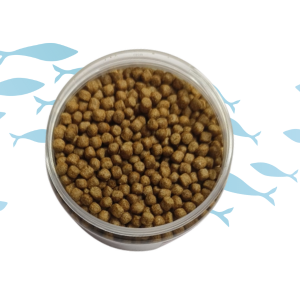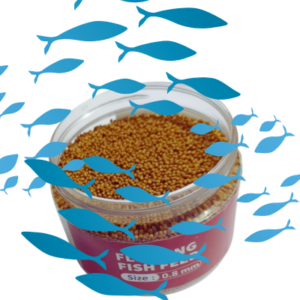Floating fish feed pellets of 2mm size are designed to meet the nutritional requirements of small to medium-sized fish species, including fingerlings, juveniles, and smaller adult fish. Here’s a detailed description of these pellets:
- Ingredients:
- Protein Source: Like larger feed pellets, the protein content in 2mm floating fish feed pellets is typically sourced from fish meal, soybean meal, or other protein-rich ingredients. Protein is crucial for the growth and development of fish.
- Carbohydrates: Carbohydrates serve as an energy source in fish feed. They are often derived from grains like wheat, corn, or rice bran.
- Lipids (Fats): Fats provide energy and essential fatty acids for fish. Sources of fats in fish feed may include fish oil, vegetable oil, or animal fat.
- Vitamins and Minerals: Essential vitamins and minerals are added to the feed to support fish health and immune function. These include vitamins A, D, E, and various B vitamins, as well as minerals like calcium, phosphorus, and potassium.
- Binders: Binders are included to help the pellets maintain their shape and integrity in water. Common binders include starches or gums.
- Additives: Additives such as colorants or flavor enhancers may be included to improve palatability. Additionally, probiotics or enzymes may be added to aid in digestion and nutrient absorption.
- Processing:
- The ingredients are finely ground into a meal.
- The meal is mixed thoroughly to ensure uniform distribution of nutrients.
- The mixture is then conditioned with steam and water to achieve the desired moisture content for pellet formation.
- The conditioned mixture is extruded through a pellet mill with a 2mm die, shaping the pellets to the desired size.
- The pellets are then dried to reduce moisture content and increase shelf stability.
- Optional coating with oils or other nutrients may be applied to enhance palatability and nutritional value.
- Nutritional Considerations:
- The protein content is vital for promoting growth and muscle development in fish.
- Lipids provide energy and are essential for maintaining cell structure and function.
- Carbohydrates serve as an energy source and may also contribute to pellet binding.
- Vitamins and minerals are essential for overall fish health, supporting various metabolic functions and immune response.
- Feeding Recommendations:
- Feeding rates and frequency depend on factors such as fish species, size, age, and environmental conditions.
- Floating pellets are designed to remain on the water’s surface, making them easily accessible for fish to consume.
- Care should be taken to avoid overfeeding, as excess feed can lead to water quality issues and health problems for the fish.





Reviews
There are no reviews yet.